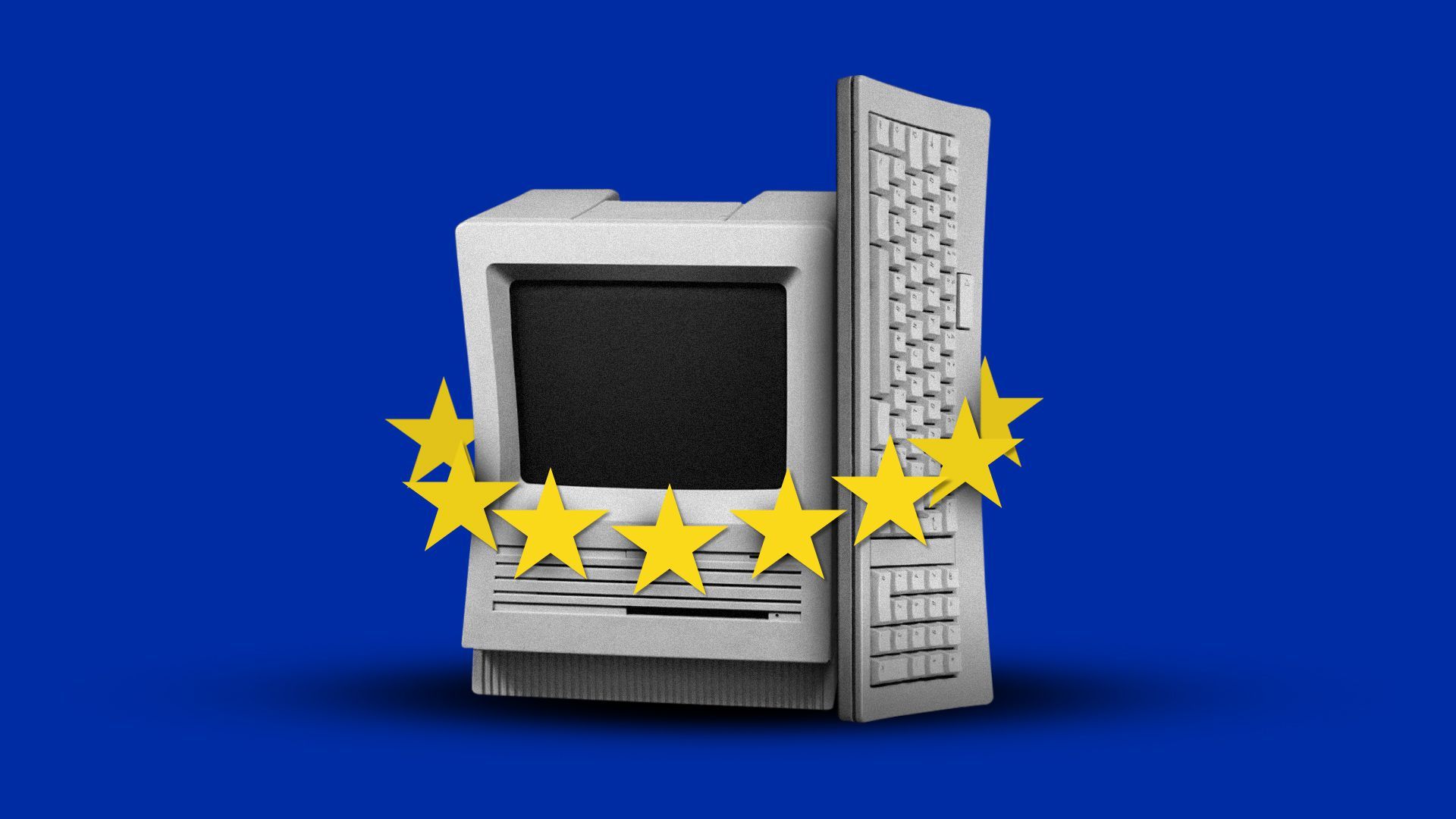Europe triples down on tough rules for tech
Add Axios as your preferred source to
see more of our stories on Google.

Illustration: Aïda Amer/Axios
The European Union Tuesday unveiled sweeping new proposals to control tech industry giants as "gatekeepers" who could be fined up to 10% of their revenue for breaking EU rules on competition.
Why it matters: Tech industry insiders tell Axios they view the proposed European laws as more restrictive than anything the companies face in the U.S. — and also tougher than anything else Europe has previously proposed.
Be smart: In the EU, "proposals," once introduced, are likely to become law in some form, even if details change dramatically through a slow feedback process.
The EU's Digital Markets Act (DMA) would set standards for treating large online platforms as "gatekeepers," based chiefly on how many users they have.
- Gatekeepers would be barred from favoring their own products over those of rivals — think Google steering users to its own restaurant reviews over Yelp's, for instance — or from using data in an exclusionary way that they've collected to develop their own products. They'd either have to avoid using such data or make it available to competitors to tap as well.
- Gatekeepers that break the rules could be subject to fines as high as 10% of annual global revenue.
The Digital Services Act (DSA) is aimed at making big platforms more accountable for user posts that break EU member nations' laws around illicit materials, such as Germany's prohibition on speech that glorifies Nazism.
- Large platforms that don't remove illegal posts following a government order could face fines of up to 6% of annual revenue.
"Antitrust has to work hand-in-hand with regulation so we have a complete set of tools," European Commission executive vice-president Margrethe Vestager told reporters Tuesday. She said the new rules are aimed in part at "future-proofing" the digital market in Europe.
Between the lines: Both laws reflect the global nature of the critiques the tech giants have faced in the U.S.
- The DMA takes up a central argument of the recent U.S. antitrust cases against Big Tech: That Amazon, Apple, Google and Facebook in particular manage their marketplaces and acquisitions to squelch competition.
- The DSA's approach mirrors efforts in the U.S. to restrict or eliminate online platforms' protections from liability for user-posted content in the name of making the companies more answerable to the public.
What they're saying: The EU proposals are rattling the tech industry.
- “We are concerned when such proposals look like they’re more designed to handcuff tech, as opposed to other industries,” said Kay Jebelli, competition and regulatory counsel at the Computer and Communications Industry Association.
Of note: The DMA has raised complaints that it's based on untested theories and could have unintended consequences.
- The law is a lot more “experimental” than past European policy efforts like the GDPR privacy law, and affects only tech companies, rather than all companies in Europe, said Christian Borggreen, head of the Brussels office for the Computer and Communications Industry Association, whose members include Amazon, Facebook, Google, Intel and Twitter.
- Google may have to drop certain Maps features in the EU if parts of the DMA governing data use and sharing with competitors become law, Matt Brittin, head of Google in Europe, told Euractiv this month.
The other side: European policymakers contend American tech giants have unfairly crowded out upstart competitors on the continent, and the proposed rules are their response.
- "It's time to have our own technological sovereignty and not depend only on Chinese or American solutions," French president Emmanuel Macron said in an interview this month.
- "We respect companies, but we say, the bigger they are, the more obligations they may have to fulfill what is important to us," EU Commissioner Thierry Breton told reporters Tuesday.
Yes, but: The rules are not emerging in a vacuum. Europe could be a test bed for other regions and countries interested in adopting the two laws as models.
- California passed its own wide-ranging digital privacy law following Europe's implementation of the GDPR.
What's next: Lengthy deliberation among regulators from EU countries, the European Parliament and all potentially impacted parties means neither of these plans is expected to become law in Europe until 2023 or so.
Editor's note: This story has been updated to reflect the release of the proposals and to add comments from EU officials as they unveiled the plans.
